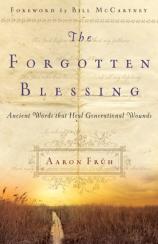The Forgotten Blessing: Ancient Words That Heal Generational Wounds
Review
The Forgotten Blessing: Ancient Words That Heal Generational Wounds
Pastor Aaron Fruh seeks an audience, a listening (and subsequently speaking) audience who will attentively hear the oft-convicting message of the power of words. Fruh, a Jewish Christian, asks readers to consider themselves and their reactions for a bit. He believes that a person's level of emotional stability can be measured in great part by the amount of verbal blessing he received as a child, and vice versa. If an individual was on the receiving end of verbal insults, blows, and negative soul-searing remarks, he will continue to battle this disapproving self-assessment for a lifetime. Fruh suggests that self-talk from a person who forever questions one's worth, nurses doubts about feeling different, and continually second guesses the ability to measure up has been on the receiving end of "curses" rather than blessings.
Fruh sets a foundation for this precept by describing what he observed as a life pattern while visiting Israel. During his visit, Fruh noticed that the Jewish people living in the Holy Land do one thing: "They consistently speak words of blessing and affirmation to one another." By offering such affirming statements, Fruh believes that God uses this ancient practice as a way to counteract "hell's councils and reverse the flow of iniquity from generation to generation." This verbal blessing, likewise, is especially powerful in bestowing wholeness, completion and healing to its recipients. The author is convinced that all people are desperate for verbal blessings, will do just about anything to receive them, and are shattered when they lose it. Fruh uses numerous Old Testament passages to further describe, define, and detail how such blessing/cursing affected biblical characters.
While Fruh's text is inspirational, it is also functionally practical and he offers ways men and women can positively affect those within their influence. Examining the eight specific parts of Jacob's blessing to his grandsons Ephraim and Manasseh in Genesis 48, readers will be better equipped to offer their own "blessing" ritual to others. These key portions of the consecration incorporated an understanding that blessing is a natural part of the Jewish life; it included a loving embrace and required a laying on of hands. The "blesser" shared his spiritual heritage and his words were characterized by "increase" and "expansion." Sensitive spiritual discernment by the blesser was a given. The blessing was verbal and spoken aloud, and it necessitated bold faith to bring results.
Of particular interest to modern-day believers is the chapter on blessing one's enemies, in which Fruh challenges Christians to follow in Jesus's stead in Matthew 5, when he commands his followers "...bless those who curse you..." By so doing, Christians are made complete and perfect in their faith, they are released from life's burdens as they trust God to vindicate, they set in motion a spirit of conviction in the offender, they are protected from God's judgment, set free and ultimately blessed as they obey.
Fruh's text concludes with a listing of ways Christians might "bless" their households and all that falls under their responsibility and rule. Perhaps the highlight of Fruh's work can be found in his ability to take a likely dry, biblical ritualistic topic and offer it with such heart that readers enthusiastically will put into practice his suggestions.
Reviewed by Michele Howe on February 1, 2006
The Forgotten Blessing: Ancient Words That Heal Generational Wounds
- Publication Date: February 1, 2006
- Genres: Christian, Christian Living
- Paperback: 174 pages
- Publisher: Chosen
- ISBN-10: 0800794028
- ISBN-13: 9780800794026




